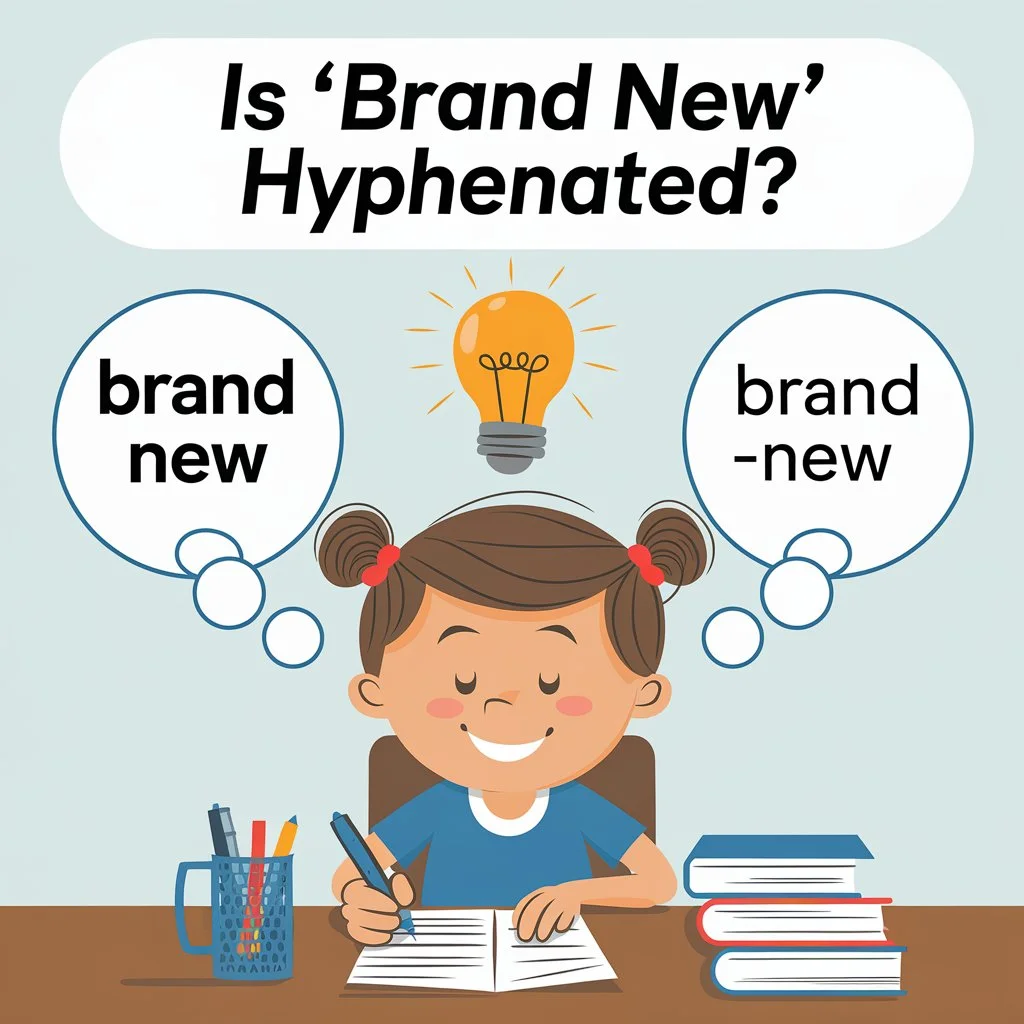Hyphenation rules in English can be tricky at first glance. However, when we dive a little deeper, these rules start to make more sense. In this article, we’ll discuss the hyphen rule for the term “brand new” and answer the question: is “brand new” hyphenated? By the end of this, you’ll know whether you’re supposed to write it as brand new or brand-new.
Brand New or Brand-New – Hyphenated or Not?
We use the hyphen in brand-new when writing it as an adjective that modifies a noun in a sentence. The noun can be anything we choose; if brand-new is modifying it, we need to use the hyphen. However, if it’s not used as an adjective and is instead acting as a noun, the words remain separate as “brand new.”
Examples of When to Use “Brand New”
When comparing brand new vs brand-new, it might seem confusing at first. Luckily, it’s easy to learn the differences by familiarizing ourselves with examples. These examples help clarify how context determines whether a hyphen is needed.
Here are examples of when to use “brand new” without the hyphen:
- The car I just bought is brand new.
- My laptop is brand new, and it works perfectly.
- This shirt feels brand new even though I’ve washed it twice.
- I’m brand new to this job, so I’m still learning.
- The game I received is brand new, still in its packaging.
- This book is brand new and has never been read.
- She brought home a brand new couch last week.
- My phone looks like it’s brand new, even though it’s a year old.
- We just moved into a brand new apartment.
- This idea is brand new, and we’re excited to implement it.
- The software on my computer is brand new and runs smoothly.
- I bought a brand new pair of shoes yesterday.
- These glasses are brand new, and they fit perfectly.
- I can’t believe how brand new my car feels after the service.
- The team is brand new to the competition but eager to win.
- I’m brand new to this city, so everything feels exciting.
- My bike is brand new, and I can’t wait to ride it.
- We received a brand new TV for the living room.
- The company is brand new and full of innovative ideas.
- I found a brand new jacket on sale at the mall.
- These headphones are brand new, and the sound quality is amazing.
- My watch is brand new, and it was a gift from my family.
- I just got a brand new tablet for work.
- The restaurant is brand new and already popular in the area.
- My friend gave me a brand new pair of earrings for my birthday.
- The laptop you’re using looks brand new, even though it’s refurbished.
- I’m brand new to the team, so I’m getting to know everyone.
- This backpack is brand new and has plenty of room for everything.
- The printer I bought is brand new, and it works so quickly.
- I’m still getting used to my brand new car and all its features.
In each of these cases, there isn’t a noun being modified by the phrase “brand new,” so the hyphen is not needed.
Examples of When to Use “Brand-New”
The hyphenated version follows similar principles but has its own specific rules. When brand-new is used to modify a noun, it becomes a compound adjective, and we use the hyphen. This grouping ensures that both words are used together to emphasize the newness of the object or person being described.
Here are examples of when to use “brand-new” with a hyphen:
- I just bought a brand-new car.
- He’s wearing a brand-new suit for the interview.
- The brand-new laptop is faster than my old one.
- She gave me a brand-new phone for my birthday.
- We moved into a brand-new apartment last week.
- This is a brand-new idea, and we should consider it.
- I’ve got a brand-new pair of shoes for the party.
- The brand-new washing machine works perfectly.
- The brand-new movie just premiered last night.
- He’s driving a brand-new sports car down the street.
- We are getting a brand-new kitchen installed next month.
- My parents just bought a brand-new sofa for the living room.
- The brand-new software update has improved performance.
- I can’t wait to try out my brand-new camera.
- Our company introduced a brand-new product this week.
- She moved into a brand-new house in the suburbs.
- The brand-new restaurant is already popular with the locals.
- He’s wearing a brand-new watch that he got as a gift.
- The brand-new TV came with all the latest features.
- They bought a brand-new bicycle for their child.
- My neighbor just got a brand-new grill for the backyard.
- I’m excited to use my brand-new headphones on the flight.
- The brand-new hotel has amazing views of the city.
- I bought a brand-new carpet for the living room.
- We got a brand-new sound system for our home theater.
- His brand-new glasses are stylish and comfortable.
- The brand-new school was built in just one year.
- They’re launching a brand-new app next month.
- The brand-new gym has state-of-the-art equipment.
- She’s reading a brand-new novel by her favorite author.
In each case, brand-new is acting as an adjective modifying a noun, so the hyphen is required to group the words correctly.
Is “Brand-New” Hyphenated in AP Style?
According to AP Style rules, hyphens serve as “joiners” that link two closely related words to convey a clear meaning to the reader. When the two words work together to modify a noun, they become a single adjective with a hyphen. Without the hyphen, “brand” would be the adjective and “new” would act as a noun, which would be incorrect in most cases.
It’s worth noting that language rules are always evolving, and some people are starting to phase out hyphens in certain situations. For instance, some may now write “brand new” as an adjective without a hyphen (e.g., brand new student). However, according to strict AP Style, this is still considered incorrect.
Should I Capitalize “New” in “Brand-New”?
Capitalization rules can be confusing when dealing with hyphenated words in titles. Two words become one, but do we still capitalize both? Let’s explore two common ways to approach capitalization:
- Capitalize the first letter of every major word, excluding prepositions, short conjunctions, and articles. In this case, “brand” would be capitalized, but “new” would remain lowercase.
- Capitalize the first letter of every word, regardless of part of speech. In this case, both “Brand” and “New” would be capitalized.
The method you choose depends on your personal preference or the style guide you are following.
Alternatives to “Brand-New”
If you’re unsure about using the hyphen correctly, it’s always a safe bet to use an alternative that doesn’t require a hyphen at all. Here are some useful alternatives to “brand-new”:
- Pristine
- Unused
- Fresh
- Mint
- New
Quiz: Brand New or Brand-New?
Let’s finish up with a quick quiz to test your knowledge on the hyphenation rules we’ve discussed:
- This car is (A. brand new / B. brand-new).
- We are (A. brand new / B. brand-new) students here.
- That’s a (A. brand new / B. brand-new) house on the road.
- I was a (A. brand new / B. brand-new) addition to the family.
- I’ve never felt so (A. brand new / B. brand-new).
Quiz Answers:
- A. brand new
- B. brand-new
- B. brand-new
- B. brand-new
- A. brand new
FAQs
Is “brand new” hyphenated?
Yes, “brand-new” is hyphenated when used as an adjective to describe a noun. For example, you say “brand-new car” because “brand-new” describes the car. However, when it’s not directly modifying a noun, use “brand new” without the hyphen.
When should I use “brand new” without a hyphen?
Use “brand new” without a hyphen when it’s not modifying a noun. For example, in the sentence “My phone is brand new,” there’s no noun directly after it. This means the hyphen isn’t needed.
Why do we hyphenate “brand-new”?
We hyphenate “brand-new” to show that it works as a single adjective. This links “brand” and “new” together to modify the noun that follows. Without the hyphen, “brand” would seem separate from “new.”
Can I use “brand new” as a noun?
No, “brand new” isn’t used as a noun. It’s used as an adjective to describe something that is completely new. You might say, “This is brand new to me,” but it’s not a noun itself.
What are alternatives to “brand-new”?
Some good alternatives to “brand-new” include words like “pristine,” “unused,” or “fresh.” These words also convey the idea of something being new without needing a hyphen.
Conclusion
In conclusion, understanding when to use “brand new” versus “brand-new” can enhance your writing clarity. The key is to remember that the hyphen is necessary when the phrase is used as an adjective to modify a noun. Without the noun, you can simply write “brand new” without the hyphen. By mastering this simple rule, you’ll be able to communicate more effectively and confidently in your writing.

It’s Elara Winters, your guide at “Grammer Grove.” I’ve dived into the intricacies of crafting the perfect English writing sections for your project, research paper, or thesis. With a wealth of experience in this field, I’m here to help you express gratitude and appreciation effectively. Join me on this journey, and let’s make your English writings shine!












